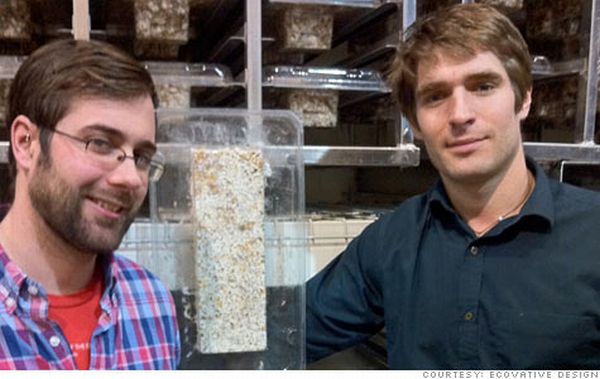
If you thought electric cars were as eco-friendly as our car makers could get, then you are in for a pleasant surprise. Fuelled by a childhood fascination with mushrooms and an interesting college project, two amateur mycologists have created a small, but unique startup in New York. Their company has thrown an open challenge to the billion dollar Styrofoam and Polystyrene industry, by making car parts out of mushrooms. This according to them is just the beginning.
Based out of Green Island, Ecovative Design, created by Eben Bayer and Gavin McIntyre in 2007, is planning to create products out of mushroom roots, which will replace polystyrene and styrofoam in everything including tables, cups, surfboards and even building insulation. This can be achieved through their eco-friendly, bio-degradable innovation – Mycelium foam.
Dennis Carlson, the logistics manager for Steelcase, an Ecovative client explains,
Ecovative’s packaging materials cost about as much as Styrofoam. Mycelium foam, on the other hand, was an affordable, low-energy solution with two additional advantages: it upcycles local agricultural waste and it decomposes on its own in the ground.
But why mushrooms? The answer lies in the sturdy root system of mushrooms, called Mycelium. This naturally occurring binding agent has been known to hold together common agricultural by-products, such as oat husks and even corn kernels.
Numerous trays of mycelium and husks in various shapes are kept in a dark room for about five long days, which gives the mycelium time to bind tighter with the husks. When this mixture is cooked and dried, it turns into a kind of waterproof and fireproof solid foam that can decompose within one month of being buried in any kind of soil.
Recently the company has tied up with Ford Motors to develop what they are calling,
a fungus-based, biodegradable foam for automotive bumpers, side doors and dashboard.
The idea behind it, as explained by McIntyre, is to be able to compost your own car.
Ford, which is already experimenting with soy-based foam for seat cushions, is looking to replace its petroleum-based foam with eco-friendly alternatives. They are already testing cooked chicken feathers, algae and wheat straw.
Deborah Mielewski, technical leader of plastics research at Ford, explains that,
Mycelium is impressive because it can be grown in any size or shape and is fireproof.
But, its not all smooth going. For starters, Ecovative needs to ensure that the mycelium grows consistently, so that the foam which is formed is of uniform density, and has no air pockets. This may prove difficult, since it is in fact growing a living organism. Mielewski points out,
When you’re growing a plant, what are the chances that these roots are perfectly consistent throughout?
The company has already enjoyed recognition for its pioneering work at the World Economic Forum, where it was honored as one of the Technology Pioneers of 2011.
As of now, with $4 million from competition winnings and grants in its kitty, Ecovative Designs is looking for new ways to use their wonder organism, Mycelium.
Source: CNNMoney




